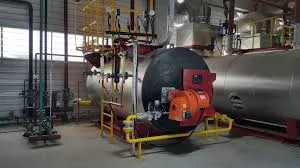
11월 . 09, 2024 12:05 Back to list
Design and Implementation of a Steam Pressure Control System for Boilers
Boiler Steam Pressure Control System An Overview
The efficient operation of a boiler steam pressure control system is essential for various industrial applications, including power generation, chemical manufacturing, and food processing. A boiler works by converting water into steam, which is then utilized to drive turbines or for heating processes. To maximize efficiency and safety, maintaining the appropriate steam pressure within the boiler is vital. This article outlines the components, operational principles, and significance of a properly designed boiler steam pressure control system.
Components of a Boiler Steam Pressure Control System
A typical boiler steam pressure control system comprises several key components, including
1. Boiler The primary apparatus where water is converted to steam through heat exchange. 2. Pressure Sensors Instruments that measure the steam pressure within the boiler. They provide real-time data, which is crucial for monitoring and control.
3. Control Valve This regulates the flow of steam based on the pressure readings obtained from the sensors. It can either open or close to adjust the steam flow to the turbines or other processes.
4. Controller A logic-based device (often a PLC) that processes the data from pressure sensors to determine the necessary adjustments to the control valve.
5. Safety Relief Valve An essential safety feature that releases steam if pressure exceeds the safe operating limit, preventing potential explosions.
Operational Principles
The operation of a boiler steam pressure control system follows a closed-loop control mechanism. When the boiler is in operation, steam generation increases the internal pressure. Pressure sensors continuously monitor this pressure and send signals to the controller. The controller compares the current pressure to a setpoint (the desired pressure level). If the detected pressure deviates from the setpoint, the controller instructs the control valve to adjust the steam flow accordingly.
boiler steam pressure control system

For instance, if the pressure rises above the setpoint, the control valve will reduce steam output or increase the feedwater supply. Conversely, if the pressure drops below the desired level, the control valve may open wider to enhance steam production. This dynamic adjustment ensures that the boiler operates efficiently while adhering to safety regulations.
Importance of Pressure Control
The importance of steam pressure control cannot be overstated. A stable pressure within the boiler leads to several operational benefits
1. Efficiency Proper management of steam pressure ensures that the boiler operates at its optimal efficiency, reducing energy costs and minimizing waste.
2. Safety By preventing excessive pressure build-up, the control system protects against catastrophic failures, which could lead to explosions or equipment damage.
3. Reliability Consistent pressure management enhances the reliability of downstream processes, ensuring that turbines and other equipment receive a stable steam supply.
4. Longevity of Equipment Fluctuating pressures can cause mechanical stress on boiler components. By maintaining stable pressure, the lifespan of the boiler and associated equipment can be extended.
5. Compliance Many industries are subject to regulatory standards concerning safety and environmental impact. A well-designed control system helps ensure compliance with these regulations.
Conclusion
In summary, a boiler steam pressure control system is a critical component of modern industrial operations, ensuring that steam generation is conducted safely and efficiently. Through advanced monitoring and control technologies, these systems enhance operational reliability while reducing costs and environmental impact. As industries continue to evolve, the integration of innovative control strategies and technologies will play an increasingly vital role in optimizing boiler operations. Understanding the fundamentals of steam pressure control is thus paramount for engineers and operators in the field.
-
Efficient Biomass Fired Hot Water Boiler | AI Heating Solution
NewsAug.01,2025
-
High-Efficiency Gas Thermal Oil Boilers | HPT Models
NewsJul.31,2025
-
Oil Fired Hot Water Boilers Sale - High Efficiency & Affordable
NewsJul.31,2025
-
High-Efficiency Commercial Oil Fired Steam Boiler for Industry
NewsJul.30,2025
-
High-Efficiency Biomass Fired Thermal Oil Boiler Solutions
NewsJul.30,2025
-
High Efficiency Gas Fired Thermal Oil Boiler for Industrial Heating
NewsJul.29,2025
Related PRODUCTS






















